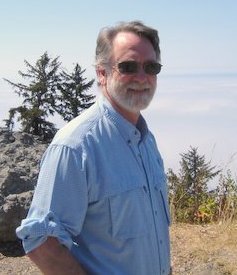Met Sin at theTrav Kod Reservoir
In June of 2008 I toured the rural community of Balang, Cambodia, inspecting a reservoir dam that had recently been constructed by Human Translation and Engineers Without Borders. As noon approached, the Buddhist monk who traveled with us, Mean So Meth, needed to eat as prescribed by his order, so we approached an elderly man who was shaping a timber under a tree with a hand adz. His name is Met Sin.
Met Sin stopped his work, greeted So Meth with a respectful prostration, laid out reed mats for us, and joined us with four of his grandchildren. When he learned that I was the father of the man he had come to know through Human Translation, he became curious. He inquired of my age and we discovered we were both approximately the same age. He inquired about my health, as he was obviously proud his own good health. He inquired about my grandchildren, as he was proudly supervising four of his own grandchildren. How many did he have? I asked. He couldn't say for certain.
My son sat beside me, acting as translator, as well as my wife – whom Met Sin respectfully ignored. His youngest grandchild looked to be about two – precisely the age of our own youngest grandchild – standing naked before us while his sister cleaned him off with the water from our water bottle.
I'd seen several hundred photos of Met Sin's grandchildren through the HT website, so I immediately felt attached to them in a special way: Beautiful children, each with a unique, individual curiosity.
As the monk finished his meal, he got out a piece of paper and began drawing on it, showing it show Met Sin. My son explained that the monk was demonstrating how voting worked because the historic second national election in Cambodia was coming up. Met Sin, my son explained, was illiterate and had never voted, and the concept of voting was new to him. His grandchildren listened and watched the exchange with intense attention.
Later I reflected on the parallels between our lives: our ages, our good health, our grandchildren, etc. We both lived in rural, agricultural communities of precisely the same size. He had been rice farming for subsistence in Balang while I had been working in the Napa Valley for wineries and grape growers. His children might have been my children; his grandchildren might have been my grandchildren; his small house might have been the same house where I had lived for the past 25 years.
Met Sin was even preparing to vote, as we in the U.S. were preparing to vote in our Presidential election.
But then I reflected on the differences between our histories: Met Sin had lived through Cambodian independence, the reign of the Khmer Rouge, the Killing Fields, the imprisonment of the entire population on forced labor communes, and the recent Civil War that had left his land riddled with land mines and unexploded munitions. And yet, when the Civil War was over, he had returned to his ancestral land at the side of this reservoir -- ruined and now rebuilt by Human Translation, EWB, and the community. He is a survivor.
In 2009 we returned to the Trav Kod Reservoir, and I'd hoped to see Met Sin again. He was away, working, but we met his wife who showed us the new fish pond where she was raising catfish - another community project sponsored by HT and it's local Community Translation organization. The little pond was a plastic-lined hole that had been dug beside their hut, and she proudly showed us how they fed the fish with the special fish food that HT had provided. It seemed like a small thing to my eyes -- a hole in the ground -- yet it's an important addition to their resources: A source of reliable protean. And if there is extra, they can sell the fish for cash.
The reservoir itself was full. The Army had improved the road and ox carts were crossing the water gate with loads of rice straw. Children slept in the carts on top of the straw as the caravan moved slowly towards the village. The previous year I'd seen ox carts carrying wood scavenged from the forests surrounding Kulen Mountain. At the time, I'd thought that the carts filled with wood was picturesque, until I realized how quickly the land was being denuded of forest. This site of the rice straw seemed like another small improvement: One that was less severe to the ecology.
I took this photo of the reservoir and one of the current HT team right before my camera's battery failed. HT had come a long way, and Met Sin's family had come a long way in a few short years.
When Tobias had first come home from Cambodia on his first trip -- committed to helping the community at Balang rebuild the reservoir -- I was as skeptical as the next person. But it had come together -- as it still is coming together -- and it makes me proud to know him and his work. Proud as a father, but also simply proud of another human being.
This Feb and March Judith and I will be returning to S.E. Asia, and I hope to be able to travel out again to meet Met Sin and see how his extended family is growing up. He's had the pleasure of seeing my family -- at least Arwen and Tobias -- mature these past six years. I want to see how his grandchildren are fairing too.







No comments:
Post a Comment